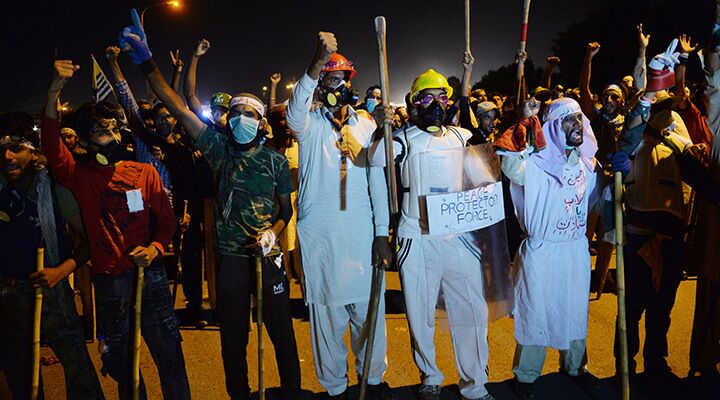
How Stable Is Nuclear-Armed Pakistan?
For the last two weeks, Pakistan’s two leading opposition movements have laid aside their differences and rallied together in a violent effort to overthrow the government of Prime Minister Nawaz Sharif.
Tens of thousands of protesters led by Imran Khan and outspoken cleric Tahir ul-Qadri have flooded into the capital city, Islamabad, saying they will not leave unless Sharif steps down. They have accused him of corruption and rigging last year’s election. The prime minister has denied all charges and has asked Khan and Qadri to negotiate. Both opposition leaders so far have refused these calls.
Since mid-August, Islamabad has been largely incapacitated by the unrest. Many roads have been closed, businesses have been suffering steep losses, and troops and police have been occupied protecting government facilities.
On Saturday evening, demonstrators broke through police lines and attempted to march on Sharif’s house. At least three were killed and hundreds injured in the unsuccessful attempt. On Monday, protesters overtook and ravaged the state television headquarters until the army cleared them out and secured the building.
On Tuesday, Interior Minister Chaudhry Nisar said, “This is not a protest, a sit-in or a political gathering. This is a rebellion. It is a rebellion against state institutions. It is a rebellion against the state of Pakistan …. They are not revolutionaries, they are intruders and terrorists.”
Although the tensions appeared to be easing on Wednesday, the unrest has unnerved the country where power is often transferred by military coups instead of elections. It has also concerned the international community, in large part because Pakistan is a member of one of the world’s most exclusive clubs: The Nuclear Nine.
Pakistan’s military, which is mostly pro-Western, controls its 100-plus nuclear weapons. But a collapse of the government could mean an uncertain future for the arms. It is possible that they could even fall under the control of some of Pakistan’s many Islamic extremists or terrorists groups. A United States government analysis, quoted by nbc News in 2011, called Pakistan “the least stable of the nine nuclear weapons states and the one where there has been significant support for Osama bin Laden and al Qaeda, not only among the general population but also within the military and intelligence forces.”
It is telling that Bin Laden was able to live, undisturbed, just a few hundred yards away from a prestigious Pakistani military academy for nearly a decade.
The instability of Pakistan’s nuclear weapons was perhaps most evident in 2007 and 2008, when homegrown terrorists attacked its nuclear sites at least three times. In November 2007, terrorists struck the nuclear missile storage facility at Sargodha. That December, a suicide bomber attacked Pakistan’s nuclear airbase at Kamra. The following August, Pakistani Taliban suicide bombers raided an armament complex at the Wah Cantonment, one of Pakistan’s primary weapons facilities, and managed to blow up several of its entry points.
Even if the current wave of unrest in Pakistan blows over, the potential for turmoil in the nuclear nation remains high.
The Trumpet has often warned of the danger of Pakistan and its nuclear arsenal falling under the control of radical Islamism. In January 2008, editor in chief Gerald Flurry wrote that “Pakistan also has the nuclear bomb and could be taken over by radical Islam, with plenty of help from Iran.” This nation, the world’s seventh-most powerful military power, could soon become a “proxy of the Iranian mullahs,” he warned, and “this would be the worst possible disaster!”
During His time on Earth, Jesus Christ specifically warned of the age of nuclear proliferation we live in today. He showed that this time of peril points to the imminence of His return. To understand how the instability in Pakistan could tie in to that hope-filled event, read Mr. Flurry’s commentary “Pakistan and the Shah of Iran.”
